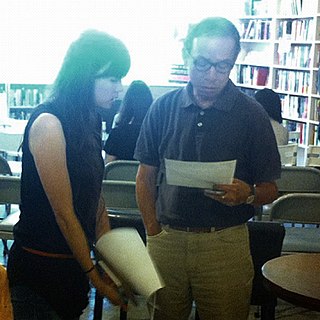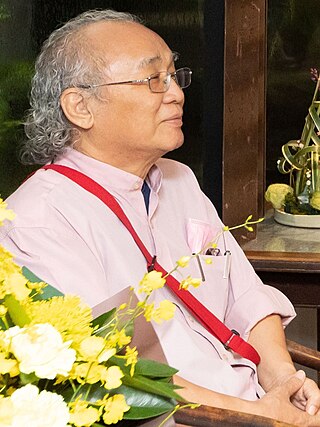Museums

Taiwanese literature refers to the literature written by Taiwanese in any language ever used in Taiwan, including Japanese, Taiwanese Han (Hokkien, Hakka and Mandarin) and Austronesian languages.
Taiwan has a very active literary scene, with a large number of writers of novels and (especially) short stories enjoying a wide readership, many of them for many decades running. A short selection of prominent writers and poets includes:
See the full list of Taiwanese writers.
Similarly, there is a large poetry community in Taiwan, and there have been several anthologies of Taiwanese poetry in English translation. The New Century New Generation Poetry Selection , edited by Taiwanese poets Xiang Yang (Poet) , targets the millennials poets (born between 1980 and 1999, active from 2000 to 2022) who created modern poetry in Taiwan. It includes 52 poets such as Liao Chi-Yu, Yang Chih-Chieh , Hsu Pei-Fen, and Lin Yu-hsuan . [1]
Two areas of cross-pollination between literature and other arts in Taiwan include modern dance (particularly the modern dance troupe Cloud Gate Dance Theater, founded and directed by author Lin Huai-min) and filmmaking (including productions of stories by Huang Chunming directed by the leading Taiwanese filmmaker Hou Hsiao-hsien).
The 1990s saw the rise of a nativist Taiwan literature movement.
More recently, Taiwan literature has also been included in Sinophone literature and world literature. [2]
With the establishment of the Communist regime in mainland China in 1949, books from mainland China were not often published in Taiwan and books from Taiwan were not often published in mainland China. In 1986, the first novel, Three Kings, written by a mainland Chinese writer, Ah Cheng, was openly published as such in Taiwan.
Some books from mainland China still found their way into Taiwan before 1986 by different ways. As pirate editions, under both a different title and a pseudonym for the author, under a different title, but with the author's name unchanged, under a pseudonym but with the title unchanged, or altered by changes in the text itself.
Often books which have a movie based on them sell well in Taiwan. The Harry Potter series are popular and so is Bridget Jones's Diary . Some non-western popular books are The Hooligan Professor , 流氓教授, by Lin Jian-long 林建隆, and Big Hospital Small Doctor 大醫院小醫師, by Hou Wun-yong 侯文詠. Both were adapted for television. Other popular non-literary works included books on mastering English and attaining success.
The awards for Taiwanese literature include Taiwan Literature Award (presented by National Museum of Taiwan Literature), Wu San-lien Literary Award (Wu San-Lien Award Foundation), Aboriginal Literature Award, and Min-Hakka Literary Award (both by the Ministry of Education of Taiwan).


Hou Hsiao-hsien is a retired Mainland Chinese-born Taiwanese film director, screenwriter, producer and actor. He is a leading figure in world cinema and in Taiwan's New Wave cinema movement. He won the Golden Lion at the Venice Film Festival in 1989 for his film A City of Sadness (1989), and the Best Director award at the Cannes Film Festival in 2015 for The Assassin (2015). Other highly regarded works of his include The Puppetmaster (1993) and Flowers of Shanghai (1998).

Chung Chao-cheng was a Taiwanese novelist and Hakka native born in the Hsinchu Prefecture during the Japanese rule period. Revered as the "Mother of Taiwanese Literature" in Taiwan, he is also frequently mentioned alongside Taiwanese writer Yeh Shih-tao, collectively known as "North Chung, South Yeh".

Yang Kui or Yō Ki, originally named Yang Kui (楊貴), was a Taiwanese writer and social activist born in Tainan, Taiwan. He used pen names such as Yang-kuei (楊逵), Yang Chien-wen (楊建文), Lai Chien-erh (賴健兒), Lin Ssu-wen (林泗文), and Ito Ryo.

A City of Sadness is a 1989 Taiwanese historical drama directed by Hou Hsiao-hsien. It tells the story of a family embroiled in the "White Terror" that was wrought on the Taiwanese people by the Kuomintang government (KMT) after their arrival from mainland China in the late 1940s, during which thousands of Taiwanese and recent emigres from the Mainland were rounded up, shot, and/or sent to prison. The film was the first to deal openly with the KMT's authoritarian misdeeds after its 1945 takeover of Taiwan, which had been relinquished following Japan's defeat in World War II, and the first to depict the February 28 Incident of 1947, in which thousands of people were massacred by the KMT.

Wu Nien-jen is a Taiwanese screenwriter, director, and writer. He is one of the most prolific and highly regarded scriptwriters in Taiwan and a leading member of the New Taiwanese Cinema, although he has also acted in a number of films. He starred in Edward Yang's 2000 film Yi Yi. Wu is a well-known supporter of the Democratic Progressive Party and has filmed commercials for the party.

Loa Ho, real name Loa Ho (賴河) and Lai Kuie-ho, pen name Lan Yun, Fu San, An Tu-shêng, Hui, Tsou Chieh-hsien, Kung I-Chi, Lang, etc., was a Taiwanese poet who was born in Changhua County, Taiwan Prefecture, Fujian-Taiwan Province, Qing dynasty. He was a medical doctor but was also a writer, poet, surgeon, and social activist from Changhua, Taiwan, having had enormous fame in literature. He founded the literature and arts column of The Taiwan Minpao and served as its editor-in-chief.
Wu Chuo-liu, born Wu Jiantian (吳建田) was an influential Taiwanese journalist and novelist of Hakka ancestry. He has been described as the most powerful witness to history in Taiwanese letters. Many of his most important novels were first written in Japanese.
The Taiwanese literature movement refers to the effort of authors, poets, dramatists, musicians, and publishers in Taiwan to establish recognition of a distinctly Taiwanese body of literature. The movement was the subject of considerable international as well as domestic debate in the 1970s and 1980s. Scholars have noted the difficulty in defining Taiwanese literature given the country's history and political relationships with Japan and China.

Li Kuei-hsien is a Taiwanese author, poet, cultural critic, translator, and inventor, born and raised in Taipei during the period of Japanese rule. He mainly writes poetry, but also provides reviews and translations.
Modern Chinese poetry, including New poetry, refers to post Qing dynasty Chinese poetry, including the modern vernacular (baihua) style of poetry increasingly common with the New Culture and 4 May 1919 movements, with the development of experimental styles such as "free verse" ; but, also including twentieth and twenty-first century continuations or revivals of Classical Chinese poetry forms. Some modern Chinese poetry represents major new and modern developments in the poetry of one of the world's larger areas, as well as other important areas sharing this linguistic affinity. One of the first poets and theorist in the modern Chinese poetry mode was Hu Shih (1891–1962).

Yang Mu was a pen name of Wang Ching-hsien (王靖獻), a Taiwanese poet, essayist, critic, translator, Professor Emeritus of Comparative Literature at the University of Washington, and Founding Dean at NDHU College of Humanities and Social Sciences and HKUST School of Humanities and Social Sciences. He is considered one of the most accomplished poets writing in Chinese in the 20th and 21st century, known for his lyricism and linguistic ingenuity, modernising the Chinese diction and syntax while reviving a sublime style out of the idiom and imagery of Chinese and Western poetic traditions.
Taiwan nativist literature. Xiangtu (鄉土), literally meaning the hometown soil, symbolizes nativism; and Wenxue (文學) is literature. It is a genre of Taiwanese literature derived from the New Literature Movement (台灣新文學運動) under the Japanese rule in the 1920s. The movement died down after 1937 when the Japanese government strengthened its colonial policy, but regained public attention in the 1970s. Taiwan nativist literature uses literary realism as its main narrative to depict people, events and subjects that happen in Taiwan, aiming at reflecting the particularity of the local society. The nativist novels usually depict the struggles for existence and predicaments of identity of the Taiwanese people with a humanistic tone. They tend to base on the life experiences of their authors, and reflect their worldviews.
Events from the year 2016 in Taiwan.

Wu Chin-fa is a Taiwanese writer of Hakka and indigenous descent. He was vice chairman of the Council of Cultural Affairs from 2004 to 2008, and later served as director of the Cultural Affairs Department within Pingtung County Government.
Events from the year 2020 in Taiwan, Republic of China. This year is numbered Minguo 109 according to the official Republic of China calendar.
Chang Kuei-hsing is a Taiwanese author, novelist and educator. Born in North Borneo (Sarawak), Malaysia in a Hakka family, he "[grew] up in a state of Sarawak amidst a racially mixed Chinese and native communities".
Chung T'ieh-min was a Taiwanese writer of Hakka descent. Most of his works were novels and essays, and some were children's literature and dramatic scripts. His writing style was simple and honest, quiet and realistic, focusing on rural Hakka themes, earning him the title of a "farmer writer". The eldest son of the renowned Hakka writer Chung Li-ho (鍾理和), Chung T'ieh-min had been writing articles for newspapers and magazines, publishing books such as Small Flowers in Stone Cracks (石罅中的小花), Yu Chung-hsiung's Spring (余忠雄的春天), and Yorkshire's Dusk ( 約克夏的黃昏). He received several literary awards, including the 15th Wu Chuo-liu Literary Prize and the Loa Ho Literature Award.
Lin Huan-chang, a native of Chiaohsi, Yilan, Taiwan, is a children's literature writer and poet with pen names Mu-yun (牧雲), To-fo (多佛), and Fang ke-pai (方克白). He has written poetry, essays, historical materials, reviews, and children's literature, and his works have been translated into multiple languages. In 1970, he won the Chinese Writers & Artists Association's (中國文藝協會) Culture and Art Award Award, which established Lin's firm position in the field of new poetry.